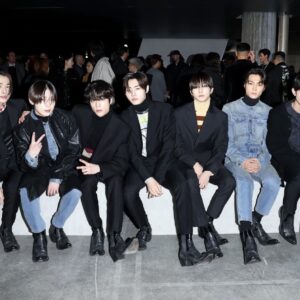Why Luxury Brands are eyeing up the South Korean Market

Last week Business of Fashion reported that K-Pop “Ruled the fashion week.” As South Korean pop music has undeniably become a worldwide phenomenon, luxury fashion brands announce more and more Korean celebrities as their global ambassadors. But why has Korea become such a big player in the luxury industry? Katharina Rolfes, MA Luxury Brand Strategy & Business student takes a closer look…
The Hallyu Wave
Due to its history as a colony of Japan and China (1910-1945) and its division after the Korean civil war (1950-1953), South Korea was once an impoverished country. Several centuries passed before South Korea established its role as a leader in the world economy. When the Asian financial crisis hit in the 1990s, the Korean wave was initially initiated by the government to enhance the economy of the country, by exporting its own electronic goods.
Korea is an export powerhouse
Currently, Korean dramas, K-Pop, films, online games, K-Beauty, and food are all part of the Hallyu wave and are widely recognised. Thanks to the strong investment in technology, South Korea nowadays possesses the second fastest Internet connection in the world and is the country with the highest Smartphone ownership worldwide.
Vogue Business reports that South Korea, nowadays, has become a luxury powerhouse and a centre of attention for luxury retail. (Vogue Business, 2022) Examples of this phenomenon are, for instance, French luxury brand Dior, which opened abeauty online boutique in Korea at the beginning of last year and even hosted its first runway show for its Fall 2022 womenswear collection in Seoul later that year.
Targeting the young generation
The growing prosperity of South Korea, the public’s interest in luxury brands and looks, as well as the country’s outstanding Internet connectivity, make it an ideal place for luxury brand marketing. However, luxury goods are not only for the older and wealthier generations anymore. koreabizwire.com implied that: “Shinsegae Department Store reported that customers in their 20s and 30s accounted for 10.9% and 39.8% of total luxury consumption, respectively.” Lotte Department Store also reported that the age groups 20 – 40 comprised 46% of all luxury consumption, jumping from 38.1% in 2018.
The Veblen and Panoplie effect is the term used by psychology professor Keum-joo Kwak to describe this phenomenon. This effect occurs when consumers believe that more expensive things are more exclusive and one of a kind. Carrying a luxury item evokes feelings of belonging to a higher class or society. “The younger generation seems to find self-esteem and a high sense of achievement as they enjoy that sense of rising to the standard of celebrities by buying what they use or wear,” Kwak said.
South Korean Ambassadors
Last but not least, a major trend in the South Korean luxury industry is celebrities, especially K-Pop idols, actors, and ambassadors. Due to the “Hallyu” wave and the global success of Korean entertainment like boy-group BTS, primarily European luxury brands have recognised the lucrative potential of these acts. BOF states: “As South Korean pop music becomes an increasingly global obsession, and as luxury megabrands sign more and more deals with its leading stars, K-pop groups’ fanatical young followers have become a fixture.”

Source: Vogue UK
K-pop supergroup Blackpink is also known for collaborating with a plethora of luxury designer brands. Jennie (from Blackpink) is not only the face of Chanel and Chanel high jewellery, but since 2022 also of Calvin Klein. However, Jisoo of Blackpink’s collaboration with Dior truly stands out. Since Dior’s creative director Maria Grazia Chiuri is so enchanted by the 27-year-old singer, she inspired the fashion house’s AW21 collection. Vogue UK reported: “There were the sweet flippy skirt suits she looks to often, the contemporary takes on Dior’s New Look silhouette we know Jisoo enjoys wearing and a slew of romance-red frothy evening gowns that have the potential to reach Blink-favourite status.” (Vogue UK, 2021)

Source: Vogue UK
Back in April 2021, K-Pop’s biggest boy group BTS was announced as a Louis Vuitton ambassador. However, since the group announced a three-year-long hiatus from joined activities last year, the members recently branched out into a lot of individual brand promotions. In mid-January member Jimin was selected as an official Dior ambassador, and member Suga followed as a Valentino ambassador. In addition, Italian luxury brand Bottega Veneta is rumoured to be eyeing another member of the group.

Source: Vogue Business
What can we expect in the future?
These examples show that the Korean luxury industry shows no signs of slowing down in the near future. South Korea recently entered the top ten of the most lucrative luxury markets worldwide and is projected to exceed $7 billion by 2024. Samjong KPMG) Keeping all these facts in mind, South Korea is definitely one of the most significant luxury markets to watch in the upcoming years.
By Katharina Rolfes, MA Luxury Brand Strategy & Business